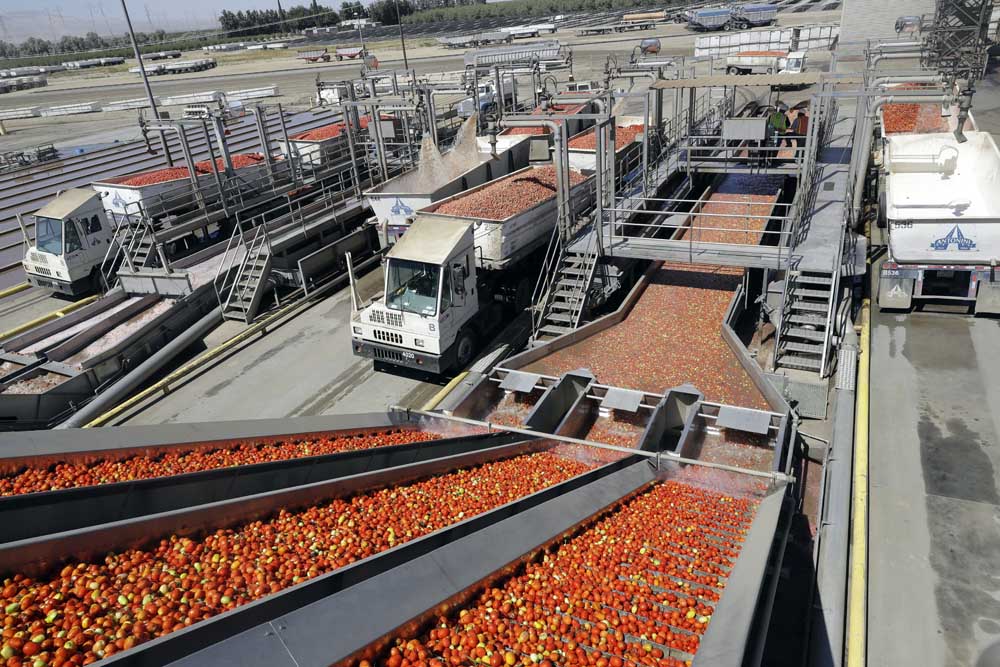Tomato processor aims to revive conspiracy lawsuit
Published 4:15 pm Monday, December 14, 2020

- Tomatoes go through a washing process at the Los Gatos Tomato Products plant in Huron, Calif. The company was the target of a racketeering and antitrust lawsuit that the 9th U.S. Circuit Court of Appeals has been asked to revive.
A California tomato company wants to revive an antitrust and racketeering lawsuit that accused a rival processor of conspiring to fix prices and suppress competition.
Morning Star Packing Co. of Williams, Calif., is seeking to convince the 9th U.S. Circuit Court of Appeals that a jury trial is warranted in its litigation against Los Gatos Tomato Products of Huron, Calif., over collusion in the processed tomato market.
A federal judge dismissed the lawsuit last year after determining that Los Gatos wasn’t part of a bribery scheme that injured Morning Star, so it couldn’t be held liable for damages under antitrust and racketeering statutes.
Morning Star alleges that while Los Gatos wasn’t directly involved in bribery, the company engaged in other components of a conspiracy among tomato processors that wouldn’t have been possible without bribery.
“The bribery was just one of the tools by which the essential nature and scope of the conspiracy was being accomplished. It was to illegally manipulate the tomato market to their benefit and to my client’s harm,” said Dale Campbell, attorney for Morning Star, during Dec. 9 oral arguments before the 9th Circuit.
Los Gatos countered that the complaint was correctly thrown out because the company didn’t benefit from bribes paid by another processor to purchasing agents of major food companies, which caused Morning Star to lose out on tomato paste contracts.
“Because they have no evidence that Los Gatos participated in the bribery, or agreed to the bribery, they have to conflate the two conspiracies: the price-fixing conspiracy and the bribery conspiracy,” Charles Jaeger, attorney for Los Gatos, told the court.
The lawsuit stems from activities involving several California tomato companies between 2005 and 2008 that aimed to undermine the market dominance of Morning Star, which was considered the lowest-cost producer in the tomato paste industry, according to court records.
Los Gatos teamed up with two other tomato processors to form an export group ostensibly intended to improve access to international markets but actually allowed members to fix prices in the domestic market and divvy up customers to reduce competition, according to court records.
One of the export group’s members, SK Foods of Williams, Calif., paid bribes to purchasing agents at Nabisco, Frito-Lay, Kraft, Safeway and other companies to ensure they’d buy the company’s tomato paste, according to court records.
The export group’s activities ended in 2008, when the Federal Bureau of Investigation executed search warrants on the member companies while probing the illegal bribery scheme.
Several bribe recipients and SK Foods employees pleaded guilty to racketeering and bribery charges, including Scott Salyer, the CEO of SK Foods, who was sentenced to six years in prison in 2013, the records indicate.
Morning Star filed lawsuits against the people and companies involved in the export group, all of whom settled the cases except for Los Gatos, which claims the bribery scheme wasn’t connected to the other activities.
Last year, U.S. District Judge Kimberly Mueller in Sacramento dismissed the lawsuit because the activities meant to increase prices for tomato paste didn’t injure Morning Star — unlike the bribery scheme, which cost Morning Star customers but didn’t directly involve companies other than SK Foods.
However, Morning Star is urging the 9th Circuit to reinstate the complaint and allow it to be heard by a jury, alleging that Los Gatos couldn’t have profited from the export group unless it went along with the bribery.
For example, Los Gatos helped facilitate a bribe to Kraft by submitting an inflated bid to make SK Foods’ bid appear legitimate, Campbell, Morning Star’s attorney, alleged in court.
Unless Los Gatos went along with the bribery scheme, SK Foods would not have joined the export group and its activities would not have resulted in financial gain for the other members, Campbell argued.
“If that had not happened, the defendant would not have gained $7.5 million of profit,” he said incourt.
Jaeger, the attorney for Los Gatos, said in court it’s unrealistic that his client would go along with the bribery in the hopes of eventual earning more money through the export group.
“It’s implausible and it’s speculative,” he said.






